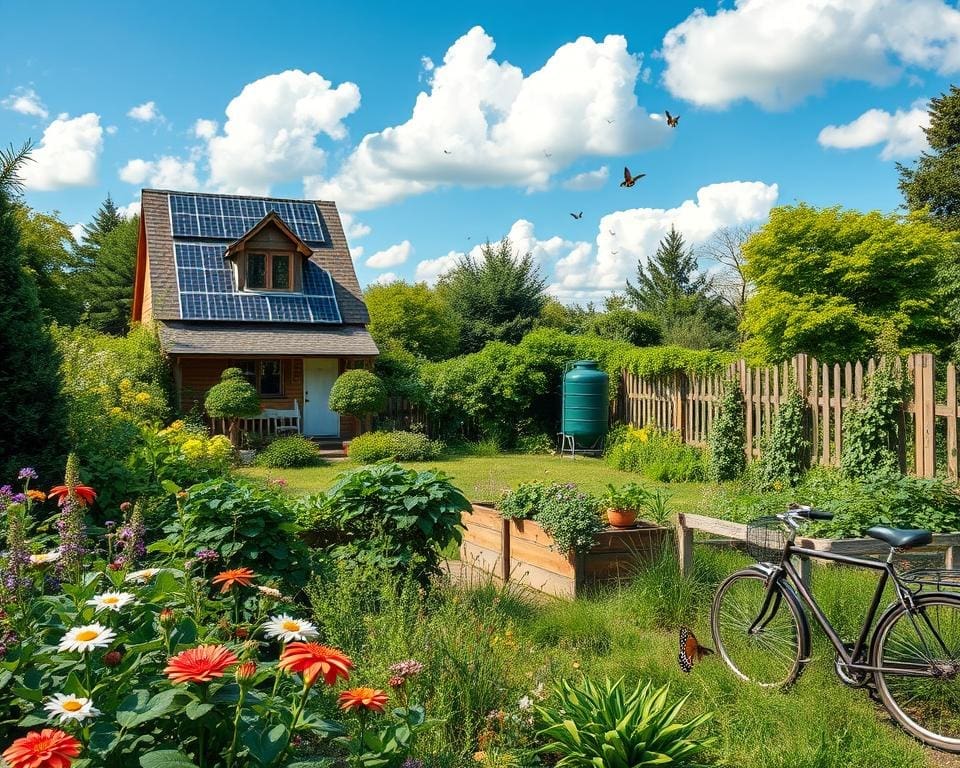In an era where climate change and environmental degradation threaten our planet, adopting an eco-friendly lifestyle is more crucial than ever. Eco-Friendly Living encompasses small yet impactful changes that collectively lead to a more sustainable future. Recent reports indicate that millions of individuals in the UK are taking action, from reducing plastic usage to enhancing recycling efforts. With over 70% of the population now actively seeking ways to minimise their carbon footprints, it’s evident that a sustainable lifestyle is gaining momentum. As highlighted by sources like the UK Government and WWF, these seemingly minor adjustments can lead to significant environmental benefits, proving that each person’s efforts count in the journey towards green living.
Understanding Eco-Friendly Living
Eco-friendly living encompasses a lifestyle that prioritises the health of our planet. This concept goes beyond simply making environmentally conscious choices; it intertwines ecological, economic, and social dimensions. Many see eco-friendly habits as burdensome or costly. These misconceptions can deter individuals from implementing sustainable living tips into their everyday routines. In reality, embracing eco-friendly practices can lead to notable savings and minimal effort.
Being environmentally conscious means recognising the impact of our actions and making informed decisions to mitigate negative effects. From reducing waste to opting for energy-efficient appliances, these small steps contribute significantly to a more sustainable future. Educated consumers are increasingly aware of their choices and the associated consequences, driving demand for eco-friendly products.
Common barriers to adopting these practices often stem from the belief that they require extensive effort or expense. Evidence shows that many sustainable living tips, such as reducing single-use plastics or growing your own herbs, are accessible and financially beneficial. By shifting perceptions of eco-friendly lifestyles, we can inspire broader participation in sustainable practices.

Simple Sustainable Lifestyle Adjustments
Incorporating eco-conscious choices into daily life can feel daunting, yet small changes pave the way for significant environmental benefits. Many individuals have discovered that adjusting their habits is a manageable and rewarding process.
Reusable bags, bottles, and containers stand as symbols of commitment to green living. Transitioning from single-use plastics to durable options reduces waste substantially. Additionally, implementing a habit of carrying a reusable coffee cup can significantly lower the number of disposable cups ending up in landfill.
Water conservation represents another crucial area for eco-conscious choices. Simple measures such as fixing leaks, using water-efficient appliances, and limiting shower times can lead to considerable water savings. Communities that have embraced collective efforts in water conservation often witness a remarkable drop in overall consumption, illustrating how individual actions contribute to broader change.
Energy conservation is also vital. Switching to energy-efficient light bulbs, unplugging electronics when not in use, and utilizing natural light wherever possible are straightforward yet impactful practices. These adjustments not only affirm commitment to green living but also offer financial savings on energy bills.
These small sustainable lifestyle adjustments, while appearing insignificant on their own, form the foundation for a larger movement. Success stories emerge from diverse communities that have embraced eco-conscious choices, collectively making a remarkable difference in the pursuit of sustainability.
Eco-Friendly Living: Small Changes for a Big Impact
Recognising everyday habits plays a crucial role in embracing an eco-friendly lifestyle. Self-awareness in our daily choices can lead to more sustainable practices. Small adjustments can have an immense impact on the environment. By examining our routines, we can discover opportunities to implement sustainable living tips that benefit both personal wellbeing and the planet.
Identifying Everyday Habits
Many daily habits affect our ecological footprint. Some common practices to assess include:
- Plastic use: Consider reducing single-use plastics by opting for reusable bags and containers.
- Water consumption: Simple measures like turning off taps while brushing teeth can conserve significant water.
- Energy usage: Be aware of how often electronics are left on unnecessarily, contributing to unnecessary energy consumption.
Practical Steps Towards Sustainability
Implementing eco-friendly practices is easier than it might seem. Here are some practical steps everyone can take:
- Composting: Turning kitchen scraps into compost can enrich soil and reduce landfill waste.
- Recycling correctly: Familiarise yourself with local recycling guidelines to ensure materials are disposed of properly, minimising contamination.
- Choosing energy-efficient appliances: Investing in appliances with high energy ratings can lower energy bills and reduce environmental impact over time.
Green Living: Reducing Your Carbon Footprint
Embracing green living entails understanding the impact of our daily choices on the environment. The concept of a carbon footprint encapsulates the total greenhouse gas emissions produced directly and indirectly by our actions. By becoming aware of our behaviours and their consequences, we can embark on a journey towards effective carbon footprint reduction.
Carbon Offsetting Options
One of the most impactful ways to counterbalance emissions is through carbon offsetting. This involves investing in projects that reduce greenhouse gases elsewhere. Popular options include:
- Tree planting: Contributing to reforestation initiatives not only absorbs CO2 but also supports biodiversity.
- Investing in renewable energy projects: Supporting solar or wind energy developments can help transition the world to greener energy sources.
- Funding community projects: Engaging with local sustainable practices helps promote eco-friendly initiatives within the community.
Transport Choices that Make a Difference
Transport choices significantly influence personal carbon footprints. Opting for sustainable methods can lead to substantial emissions reductions. Consider the following alternatives:
- Walking: A simple yet effective way to reduce emissions and improve health.
- Cycling: An excellent mode of personal transport that emits no greenhouse gases.
- Public transport: Using buses or trains instead of private vehicles lowers overall emissions and lessens road congestion.
Adopting Climate-Friendly Habits
In today’s world, adopting climate-friendly habits can significantly contribute to a healthier planet. Simple yet impactful changes in daily routines create a collective influence that helps combat climate change. Favouring plant-based meals and reducing meat consumption not only benefits individual health but also alleviates the environmental burden caused by livestock farming.
Utilising sustainable products is another effective way to practise environmentally conscious living. Consider eco-friendly alternatives for common household items, such as biodegradable cleaning supplies and reusable shopping bags. These small choices ensure a noticeable reduction in waste, aligning individual actions with broader sustainability goals.
Engaging in community environmental initiatives remains vital. Participating in local clean-up events or tree-planting campaigns fosters a sense of community while reinforcing climate-friendly habits. These actions not only improve the environment but also inspire others to become environmentally conscious, creating a ripple effect of positive change.
Consistency is key when integrating these climate-friendly habits into family life. Encourage family members to join in, making it a shared effort. By setting reminders and introducing fun challenges centred around sustainability, maintaining these habits becomes easier over time. Celebrate achievements together, reinforcing the importance of commitment to a greener planet.
Ethical Consumption in Your Daily Life
Embracing ethical consumption plays a vital role in creating a sustainable future. By prioritising ethical choices, individuals not only support environmentally friendly practices but also promote social justice and economic fairness. This shift fosters a healthier planet while encouraging stronger local communities.
Supporting Local and Organic Brands
When you choose to support local brands, you contribute to the vitality of your community and the local economy. Buying from nearby farmers and artisans reduces transportation emissions, which is a significant aspect of your carbon footprint. In addition, supporting organic brands often means opting for products that are better for the environment, as these brands typically avoid harmful pesticides and synthetic fertilisers. By making these conscious choices, consumers can greatly impact sustainable agricultural practices.
Understanding Product Labels and Certifications
Reading product labels can sometimes feel overwhelming, yet it is crucial for making informed decisions. Look for certifications that signify ethical production processes, such as Fair Trade, Organic, or local sourcing labels. Understanding what these labels represent empowers consumers to align their purchases with their values of ethical consumption. Familiarise yourself with the standards set by organisations, ensuring that your choices reflect a commitment to sustainability and support for local brands.
Creating a Green Home
Transforming your living space into an eco-friendly haven is not only achievable but profoundly rewarding. By embracing green home practices, you can significantly reduce your environmental impact while enhancing your quality of life. Begin with sustainable materials for home renovations, such as reclaimed wood or bamboo flooring, which not only contribute to reducing waste but also add a unique character to your home.
In addition to using eco-friendly construction materials, consider integrating energy-efficient appliances. According to the Energy Saving Trust, upgrading to A-rated appliances can cut energy consumption by up to 50%. This is not only beneficial for the planet but also brings considerable savings on your utility bills. Furthermore, methods to reduce water usage, such as low-flow showerheads and dual-flush toilets, play a crucial role in promoting eco-conscious living.
Don’t overlook the impact of greenery within your home. Indoor plants, championed by The Royal Horticultural Society, greatly improve air quality and contribute to overall well-being. Incorporating species like spider plants and peace lilies can increase humidity and filter out toxins, creating a healthier environment for you and your family. By implementing these simple yet effective strategies, you can cultivate a sustainable living space that nurtures both the planet and its inhabitants.









